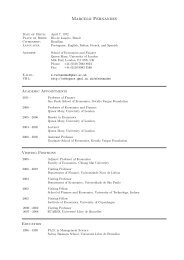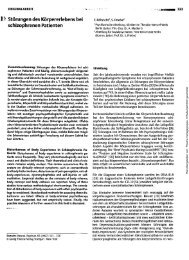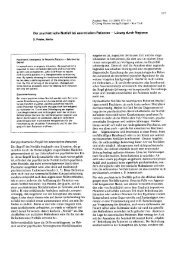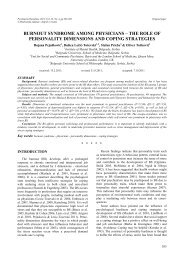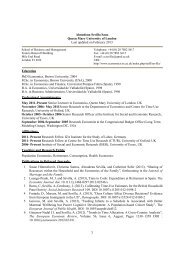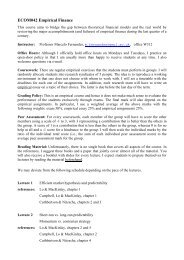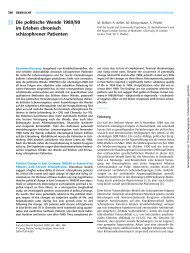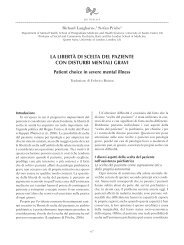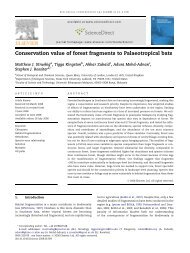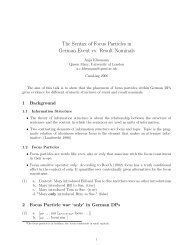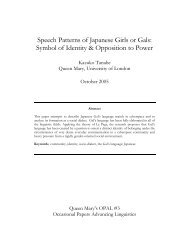Proofs - Personal Webspace for QMUL - Queen Mary, University of ...
Proofs - Personal Webspace for QMUL - Queen Mary, University of ...
Proofs - Personal Webspace for QMUL - Queen Mary, University of ...
Create successful ePaper yourself
Turn your PDF publications into a flip-book with our unique Google optimized e-Paper software.
© 2012 Elsevier Masson SAS. All rights reserved.<br />
European Psychiatry 27 (2012) / supplement n°2 / S4-S9<br />
ABSTRACT<br />
<strong>Pro<strong>of</strong>s</strong><br />
68767<br />
EUROPEAN<br />
PSYCHIATRY<br />
THE JOURNAL OF THE EUROPEAN PSYCHIATRIC ASSOCIATION<br />
The willingness to participate in health research studies <strong>of</strong> individuals<br />
with Turkish migration backgrounds: barriers and resources<br />
D. Dingoyan a, *, H. Schulz a , M. Mösko a<br />
a <strong>University</strong> Medical Center Hamburg- Eppendorf, Department <strong>of</strong> Medical Psychology, Germany<br />
Keywords:<br />
Migration<br />
Underrepresented<br />
Minority<br />
Participation<br />
Recruitment<br />
Barriers<br />
Research study<br />
1. Introduction<br />
Multiple health research studies, especially in the context<br />
<strong>of</strong> cancer- related research in the US, have reported the lower<br />
participation rates <strong>of</strong> underrepresented populations, such as<br />
the elderly, women, residents <strong>of</strong> rural areas, individuals <strong>of</strong> low<br />
socioeconomic status and ethnic minority groups [10,13,19,20].<br />
In the context <strong>of</strong> European migration health research, lower<br />
participation rates have been found among individuals with<br />
migration backgrounds [1,7,16]. Additionally, in a pre- test<br />
study <strong>of</strong> the German National Health Survey <strong>for</strong> Children and<br />
Adolescents, considerable differences in response rates were<br />
* Corresponding Author.<br />
E-mail address: d.dingoyan@uke.de (D. Dingoyan)<br />
ISSN 0924-9338<br />
June 2012<br />
Vol. 27 - Supplement n°2<br />
pp. S1-S81<br />
Migration<br />
and Mental Health<br />
S1 Editorial<br />
A. Heinz, U. Kluge<br />
S4 The willingness to participate in health research<br />
studies <strong>of</strong> individuals with Turkish migration<br />
backgrounds: barriers and resources<br />
D. Dingoyan, H. Schulz, M. Mösko<br />
S10 Socio-economic status and emotional distress<br />
<strong>of</strong> female Turkish immigrants and native<br />
German women living in Berlin<br />
MC. Aichberger, Z. Br omand, A. Heredia<br />
Montesinos, S. Temur-Erman, A. Mundt,<br />
A. Heinz, MA. Rapp, M. Schouler-Ocak<br />
S17 Mental health <strong>of</strong> Turkish women in Germany:<br />
resilience and risk factors<br />
Z. Bromand, S. Temur-Erman, R. Yesil,<br />
A. Heredia Montesinos, MC. Aichberger,<br />
D. Kleiber, M. Schouler-Ocak, A. Heinz,<br />
MC. Kastrup, MA. Rapp<br />
S22 The infl uence <strong>of</strong> stigma on depression, overall<br />
psychological distress, and somatization<br />
among female Turkish migrants<br />
A. Heredia Montesinos, MA. Rapp, S. T emur-<br />
Erman, A. Heinz, U. Hegerl, M. Schouler-Ocak<br />
S27 Translation and adaptation <strong>of</strong> the Zung<br />
Self-Rating Depression Scale <strong>for</strong> application<br />
in the bilingual Azerbaijani population<br />
F. Mammadova, M. Sultanov, A. Hajiyeva,<br />
M. Aichberger, A. Heinz<br />
S32 Construction and interpretation <strong>of</strong> self-related<br />
function and dysfunction in Intercultural<br />
Psychiatry<br />
A. Heinz, F. Bermpohl, M. Frank<br />
S44 Explanatory models and concepts<br />
<strong>of</strong> West African Malian patients<br />
with psychotic symptoms<br />
F. Napo, A. Heinz, A. Auckenthaler<br />
S50 How to express mental health problems:<br />
Turkish immigrants in Berlin compared<br />
to native Germans in Berlin<br />
and Turks in Istanbul<br />
A. Vardar, U. Kluge, S. P enka<br />
S56 Health services and the treatment<br />
<strong>of</strong> immigrants: data on service use, interpreting<br />
services and immigrant staff members<br />
in services across Europe<br />
U. Kluge, M. Bogic, W. Devillé, T. Greacen,<br />
M. Dauvrin, S. Dias, A. Gaddini, NK. Jensen,<br />
E. Ioannidi-Kapolou, R. Mertaniemi,<br />
R. P uipcinós i Riera, S. Sandhu, A. Sar vary,<br />
JFF. Soares, M. Stankunas, C. Straßmayr ,<br />
M. Welbel, A. Heinz, S. Priebe<br />
S63 The concept <strong>of</strong> “intercultural opening”:<br />
development <strong>of</strong> an assessment tool<br />
<strong>for</strong> the appraisal <strong>of</strong> its current implementation<br />
in the mental health care system<br />
S. P enka, U. Kluge, A. Vardar, T. Borde,<br />
D. Ingleby<br />
S 70 Cross-cultural training in mental health care<br />
– challenges and experiences from Sweden<br />
and Germany<br />
S. Bäär nhielm, M. Mösko<br />
S75 Teaching psychiatry and establishing<br />
psychosocial services – lessons<br />
from Afghanistan<br />
I. Missmahl, U. Kluge, Z. Br omand, A. Heinz<br />
S80 Epilogue<br />
A. Kleinman<br />
Background.- Lower participation rates <strong>of</strong> ethnic minorities in health research studies and potential<br />
participation barriers are commonly reported.<br />
Methods.- Four semi- structured focus groups <strong>of</strong> individuals with Turkish migration backgrounds living<br />
in Germany were conducted to identify potential participation barriers. Documented statements<br />
and superscripted presentation cards by the participants were evaluated with a qualitative content<br />
analysis.<br />
Results: The following eight potential reasons <strong>for</strong> the lower participation rates were identifi ed: role<br />
<strong>of</strong> women, lack <strong>of</strong> knowledge, lack <strong>of</strong> interest, German- Turkish interactions, mistrust, anxiety, data<br />
privacy protection and benefi ts <strong>of</strong> the study. Additionally, the following recruitment strategies to<br />
enhance participation rates were found: public relations, especially word- <strong>of</strong>- mouth promotion and<br />
contacting Turkish key fi gures, (non- ) tangible incentives and trust building through transparent<br />
communication <strong>of</strong> the project and its conditions.<br />
Discussion: The fi ndings provide a wide range <strong>of</strong> potential participation barriers and implications that<br />
should be considered to enhance the participation rates <strong>of</strong> minority populations.<br />
Conclusion: The willingness to participate in health research studies can be increased through particular<br />
ef<strong>for</strong>ts, which should be tailored to the recruitment <strong>of</strong> the underrepresented target population.<br />
© 2012 Elsevier Masson SAS. All rights reserved.<br />
identifi ed across different migration groups. The analyses have<br />
indicated that individuals with Turkish migration backgrounds<br />
participate signifi cantly less than, <strong>for</strong> example, individuals<br />
with Polish migration backgrounds [17,24]. Several barriers<br />
have been reported as possible reasons <strong>for</strong> the reduced participation<br />
<strong>of</strong> underrepresented populations in health research<br />
studies, such as fear (e.g. <strong>of</strong> negative consequences or <strong>of</strong> being<br />
misused as guinea pigs), lack <strong>of</strong> in<strong>for</strong>mation, mistrust (e.g.,<br />
<strong>of</strong> scientifi c institutions and their members, <strong>of</strong> government)<br />
and concerns caused by negative experiences with health<br />
research studies [4,5,25]. Signifi cant limitations have also been<br />
observed in the planning process <strong>of</strong> research studies, such as<br />
the failure to determine adequate goals to successfully recruit<br />
ethnic minority groups [2,8,21]. Moreover, research staff<br />
may also hold negative views and stigmatisations <strong>of</strong> ethnic<br />
minority groups, and thus, underestimate the willingness and<br />
ability <strong>of</strong> ethnic minority groups to participate in research



